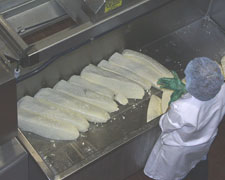Food Science Concentrations
- Food Technology
- Food Business and Industry
- Food Packaging
- Basic Science
Food Technology: Focus on Food Processing and Quality
Total Credits: 23
The concentration in food technology provides the student with extra emphasis in food processing operations. This concentration will prepare graduates for careers in production supervision, quality assurance, inspection, product development and process development. Students may concentrate study within one or more of the four commodity groups, integrating the study of production methods and their effect on food quality and process characteristics. Graduates will also be prepared for postgraduate studies leading to research, production and management careers in the food industry, government and academia.
All of the following courses:
STT 201 Statistical Methods (4)
CEM 143 Survey of Organic Chemistry (4)
BMB 200 Introduction to Biochemistry (4)
FSC 420 Quality Assurance (2)
Nine Credits from the following courses:
FSC 430 Food Processing: Fruits and Vegetables (3)
FSC 431 Food Processing: Cereals (3)
FSC 432 Food Processing: Dairy Foods (3)
FSC 433 Food processing: Muscle Foods (3)
FSC 421 Food Laws and Regulations (3)
HB 100 Introduction to Hospitality Business (2)
HB 265 Food Management: Safety and Nutrition (3)
HB 267 Management of Food and Beverage Systems (3)
HNF 300 Experimental Approaches to Foods (4)
Elective:
FSC 493 Professional Internship (1-6)
Food Business and Industry: Business, Distribution and Marketing Aspects of Food
Total Credits: 23
This concentration prepares students for employment in food or food-related businesses, where knowledge of food science, marketing and business is important. Course work readies students for careers in manufacturing management, technical sales, food product marketing or similar areas. Courses in marketing and food systems supplement the core program of basic sciences and food science thereby integrating the science of food with business, management and economics. Selected electives in this concentration can prepare students for entry into MBA programs at most business schools. Several courses in this concentration can be used toward completion of the Minor in Food Industry Management.
All of the following courses: (17 Credits)
STT 315 Introduction to Probability and Statistics for Business (3)
CEM 143 Survey of Organic Chemistry (4)
BMB 200 Introduction to Biochemistry (4)
ACC 230 Survey of Accounting Concepts (3)
MKT 327 Introduction to Marketing (3)
Two of the following courses:
MKT 302 Consumer and Organizational Buyer Behavior (3)
ABM 100 Decision Making in the Agri-Food System (3)
ABM 222 Agribusiness and Food Industry Sales (3)
FIM 220 Food Product Marketing (3)
FIM 335 Food Marketing Management (3)
FI 311 Financial Management (3)
or
ABM 435 Financial Management in the Agri-Food System (3)
Elective:
FSC 493 Professional Internship (1-6)
Food Packaging: Focus on Food Packaging Systems and Product Stability
Total Credits: 29
The food packaging concentration supplements a strong core in the basic and applied sciences and food sciences with an emphasis in food packaging. Courses focus on design, use and evaluation of food packaging materials. For example, course topics include physical and chemical properties of packaging materials as well as methodology used to study the effect of packaging materials on the shelf life of food. This concentration prepares students for careers in the food industry and offers excellent preparation for graduate studies in packaging or food science.
All of the following courses: (29 Credits)
MTH 126 Survey of Calculus II, (3)
STT 201 Statistical Methods (4)
CEM 143 Survey of Organic Chemistry (4)
BMB 200 Intro to Biochemistry (4)
PKG 101 Principles of Packaging (3)
PKG 221 Packaging with Glass and Metal (3)
PKG 322 Packaging with Paper and Paperboard (4)
PKG 323 Packaging with Plastics (4)
Elective:
FSC 493 Professional Internship (1-6)
Basic Food Science
Total Credits: 25
The Basic Food Science concentration fills many, but not all, of the minimum requirements for admission to professional schools. Students interested in preparing for post-graduate professional programs should consult with a preprofessional advisor in the College of Natural Science. Admission requirements of professional schools vary and the student is responsible for reviewing the requirements of each school of interest and consulting regularly with an advisor
All of the following courses:
BMB 401 Comprehensive Biochemistry (4)
CEM 251 Organic Chemistry I (3)
CEM 252 Organic Chemistry II (3)
CEM 255 Organic Chemistry Laboratory (2)
STT 201 Statistical Methods (4)
Nine credits from the following courses:
ANS 407 Food and Animal Toxicology (3)
ANS 417 Topics in Toxicology (1)
CEM 262 Quantitative Analysis (3)
CEM 333 Instrumental Methods and Applications (3)
CEM 383 Introductory Physical Chemistry I (3)
FSC 342 Food Safety and Hazard Analysis Critical Control Point Program (3)
FSC 421 Food Laws and Regulations (3)
MMG 409 Eucaryotic Cell Biology (3)
MMG 425 Microbial Ecology (3)
MMG 431 Microbial Genetics (3)
MMG 445 Basic Biotechnology (3)
MMG 451 Immunology (3)
PHM 350 Introductory Human Pharmacology (3)
PHM 450 Intro to Chemical Toxicity (3)
Electives:
FSC 493 Professional Internship (1-6)
PHY 232 Introductory Physics II (3)




 Print
Print Email
Email